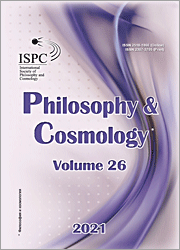Paradoxical Nature of Language in Terms of its Acquisition and Learning (Based on Plato’s “Cratylus”)
Paradoxical Nature of Language in Terms of its Acquisition and Learning (Based on Plato’s “Cratylus”)
Author(s): Pavlo Sodomora, Oleh YerchenkoSubject(s): Epistemology, Language acquisition, Ancient Philosphy, Philosophy of Language
Published by: Международное философско-космологическое общество
Keywords: paradox; understanding; perception; essentialism; linguistics;
Summary/Abstract: The process of learning is analogous to the process of motion, as well as it resembles the progress from less to more perfect. Plato, combining two opposites, attempts at reconciliation of the theories of Heraclitus and Parmenides, providing us with his amazing theory of Forms. In light of this, he speaks of language as a means of cognizance of the Universe. In his own turn, and much later, Ludwig Wittgenstein, combining incompatible, speaks of language as the single subject which requires explanation. As well as it can be seen from the history of the development of understanding, those who dared to combine two opposites have come up with amazing discoveries. New discoveries in the field of gravity are likely to throw some light on the solutions to Zeno’s paradoxes and, at the same time, reveal and explain to us the paradoxical nature of language acquisition. The article argues that the phenomenon of language possesses a paradoxical nature that seems not to be unambiguously explained by behavioristic theories. As a result, this view serves to the development and improvement of newer approaches to the learning of a second language, which is completely distinct from the process of primary language acquisition.
Journal: Philosophy and Cosmology
- Issue Year: 26/2021
- Issue No: 26
- Page Range: 123-131
- Page Count: 9
- Language: English

